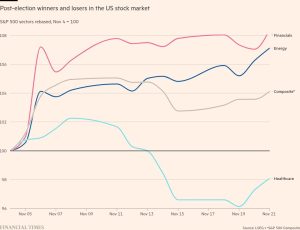quick win or damaging precedent?

This article is an on-site version of our Moral Money newsletter. Premium subscribers can sign up here to get the newsletter delivered three times a week. Standard subscribers can upgrade to Premium here, or explore all FT newsletters.
Visit our Moral Money hub for all the latest ESG news, opinion and analysis from around the FT
Hello again from Baku, where the COP29 climate summit is nearly midway through its first week. Negotiators still have some big divides to bridge on the “new collective quantified goal” for climate finance that is meant to be agreed here.
The EU and other rich nations want to talk about widening the contributor base for international climate assistance — that is, getting a larger group of countries to stump up cash, perhaps including nations such as China or Saudi Arabia.
The G77/China negotiating group is resisting this, and pushing for rich nations to agree to an annual climate finance target of $1.3tn. As I mentioned on Monday, it’s very striking that China has succeeded in forming a single negotiating platform on this issue with the huge G77 group of developing nations (which despite its name has more than 130 members).
Still, on one subject, COP29 has arrived at a remarkably swift agreement, as I explain below. And while the conference’s leaders have cheered this as an early win, some others are sounding a very different note.
COP29 in brief
-
Chinese envoy Liu Zhenmin called on the US to engage in “constructive dialogue” on climate change.
-
Azerbaijan’s President Ilham Aliyev said nations “should not be blamed” for having fossil fuel resources.
-
Prime Minister Sir Keir Starmer said his government was “renewing UK climate leadership”, as he announced a slightly more ambitious emissions reduction goal for 2035.
An early, contentious step forward on carbon markets
Anyone could get impatient after working on the same project for nine years. That’s one possible interpretation of the story behind a high-profile move on international carbon trading on the first night of COP29 — which was hailed by the conference leadership and by carbon market executives as a big step forward, but decried by some non-profit groups as a damaging breach of process.
At issue is Article 6.4 of the Paris Agreement. This clause of the 2015 text was aimed at creating an international carbon credit market under the UN umbrella, to unlock financial flows from companies and other non-state actors that would help nations reduce carbon emissions.
But ever since Paris, countries have failed to agree on the principles that will guide this market. In the run-up to COP29, the official supervisory body for this subject — 24 officials nominated by member states and regional groups — decided to force the issue.
They prepared a 15-page set of guidelines for what sort of projects should be eligible to sell carbon credits under the mechanism. Requirements included a “conservative” approach to estimating carbon mitigation impacts, and transparency around data used and assumptions made by project developers. A second document dealt with specific guidelines for projects that remove carbon from the atmosphere (as opposed to those that aim to prevent or reduce emissions — see our earlier piece on the importance of this distinction).
The conventional next step would have been to present these principles for consideration at the COP, and await permission to implement them. Instead, the supervisory body just went ahead and adopted them — and in effect dared the delegates in Baku to order them to reverse that step.
The bold tactic paid off. The Azerbaijani organisers of the conference grabbed the opportunity for a quick win, putting this matter on the agenda for the very first day. No country had the stomach for a serious fight on this issue, and the meeting on Monday night in effect gave an green light to the supervisory body’s adoption of its new principles.
This was decried by several non-profit groups, who called this a breach of due process, and questioned whether the new guidelines would prove strict enough to ensure high standards. “Approving these carbon market rules without discussion or debate sets a dangerous precedent for the entire negotiation process,” said Erika Lennon, a lawyer at the Center for International Environmental Law.
At a press conference yesterday, COP29 lead negotiator Yalchin Rafiyev stressed that the Azerbaijani hosts had worked to build international consensus around the proposals ahead of the conference, leading to the relatively quick approval.

“This is not some bit of arcane UN bureaucracy,” added Simon Stiell, executive secretary of the UN climate change convention. “When operational, these carbon markets will help countries implement their climate plans faster and cheaper, driving down emissions.”
There was an enthusiastic response, too, from many people involved in the existing voluntary carbon credit industry. This sector has been through a rough couple of years. A series of investigations has raised concerns that some carbon credit projects — largely those seeking to avoid emissions from deforestation — may have been exaggerating their real impact. Demand has dwindled among many corporate buyers, wary of “greenwashing” accusations.
Some in the sector hope that a clear framework, backed by the credibility of the UN, could help to restore confidence in the quality of carbon credits. Project developers might in theory see rising demand for credits that could be traded under the UN system.
Yet any celebrations in the sector would be very premature. The carbon credit methodology set out by the supervisory body enshrines some important high-level principles. But it still has to do a huge amount of work on explaining how they will be applied in practice — as was reflected by the agreement at COP29 on Monday night, which instructs the body to “expeditiously elaborate” on the standards it has developed. There is still no agreement on when or how to bring the mechanism into operation, something that could be years away.
Moreover, it remains unclear what would induce companies to buy carbon credits in large quantities. One incentive would be if they could use these credits to reduce their liability under national carbon pricing schemes. Countries from South Korea to Switzerland to Colombia already allow this to a limited extent. In principle, a UN-endorsed system might give governments the confidence to allow greater use of offsetting by companies — spurring larger flows of capital to fund climate friendly projects around the world, especially in developing nations.
But to really address concerns about carbon credit integrity, the new UN mechanism would need to impose standards so high that they would force prices up dramatically, limiting demand, argued Gilles Dufrasne, a policy expert at think-tank Carbon Market Watch (which recently published a useful brief guide to the key issues around Article 6).
“If it’s high-quality and high-credibility, it will be expensive,” Dufrasne said. “It would be a niche mechanism. We’re not talking about a mechanism that could deliver hundreds of millions of tonnes of emissions reduction.”
Quote of the day
ExxonMobil chief executive Darren Woods, attending his second COP, has called for US president-elect Donald Trump not to pull out of the Paris Agreement, as he did in his first term:
We need a global system for managing global emissions. Trump [has] talked about coming back into government and bringing common sense back into government. I think he could take the same approach in this space.
This follows similar remarks last week from Patrick Pouyanné, chief executive of French oil major TotalEnergies, who argued against radical deregulation of the US fossil fuel sector.
Smart reads
X-rated Some corporate advertisers who had turned their backs on Elon Musk’s X over ethical and reputational concerns are set to resume spending on the social network after Donald Trump’s election win.
Sick notes What does a good corporate policy on staff illness look like?
Cash call It’s time to close the green finance gap, writes European Central Bank president Christine Lagarde.
Recommended newsletters for you
FT Asset Management — The inside story on the movers and shakers behind a multitrillion-dollar industry. Sign up here
Energy Source — Essential energy news, analysis and insider intelligence. Sign up here
#quick #win #damaging #precedent






